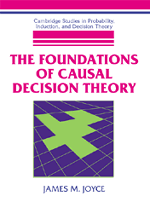Book contents
- Frontmatter
- Contents
- Preface
- Introduction: A Chance to Reconsider
- Chapter 1 Instrumental Rationality as Expected Utility Maximization
- Chapter 2 Decision Problems
- Chapter 3 Savage's Theory
- Chapter 4 Evidential Decision Theory
- Chapter 5 Causal Decision Theory
- Chapter 6 A General Theory of Conditional Beliefs
- Chapter 7 A Representation Theorem for Causal Decision Theory
- Chapter 8 Where Things Stand
- References
- Index
Chapter 7 - A Representation Theorem for Causal Decision Theory
Published online by Cambridge University Press: 25 July 2009
- Frontmatter
- Contents
- Preface
- Introduction: A Chance to Reconsider
- Chapter 1 Instrumental Rationality as Expected Utility Maximization
- Chapter 2 Decision Problems
- Chapter 3 Savage's Theory
- Chapter 4 Evidential Decision Theory
- Chapter 5 Causal Decision Theory
- Chapter 6 A General Theory of Conditional Beliefs
- Chapter 7 A Representation Theorem for Causal Decision Theory
- Chapter 8 Where Things Stand
- References
- Index
Summary
Having come to grips with the concept of a conditional belief we now return to the problem of proving a representation theorem for causal decision theory. No decision theory is complete until it has been supplemented with a representation theorem that shows how its “global” requirement to maximize expected utility theory will be reflected at the “local” level as constraints on individual beliefs and desires. The main foundational shortcoming of causal decision theory has always been its lack of an adequate representation result. Evidential decision theory can be underwritten by Bolker's theorem and the generalization of it that was established at the end of Chapter 4. This seems to militate strongly in favor of the evidential approach. In this chapter I remove this apparent advantage by proving a Bolker-styled representation result for an abstract conditional decision theory whose two primitives are probability under a supposition and preference under a supposition. This theorem is, I believe, the most widely applicable and intuitively satisfying representation result yet attained. We will see that, with proper qualifications, it can be used as a common foundation for both causal decision theory and evidential decision theory. Its existence cements one of the basic theses of this work.
- Type
- Chapter
- Information
- The Foundations of Causal Decision Theory , pp. 224 - 251Publisher: Cambridge University PressPrint publication year: 1999



